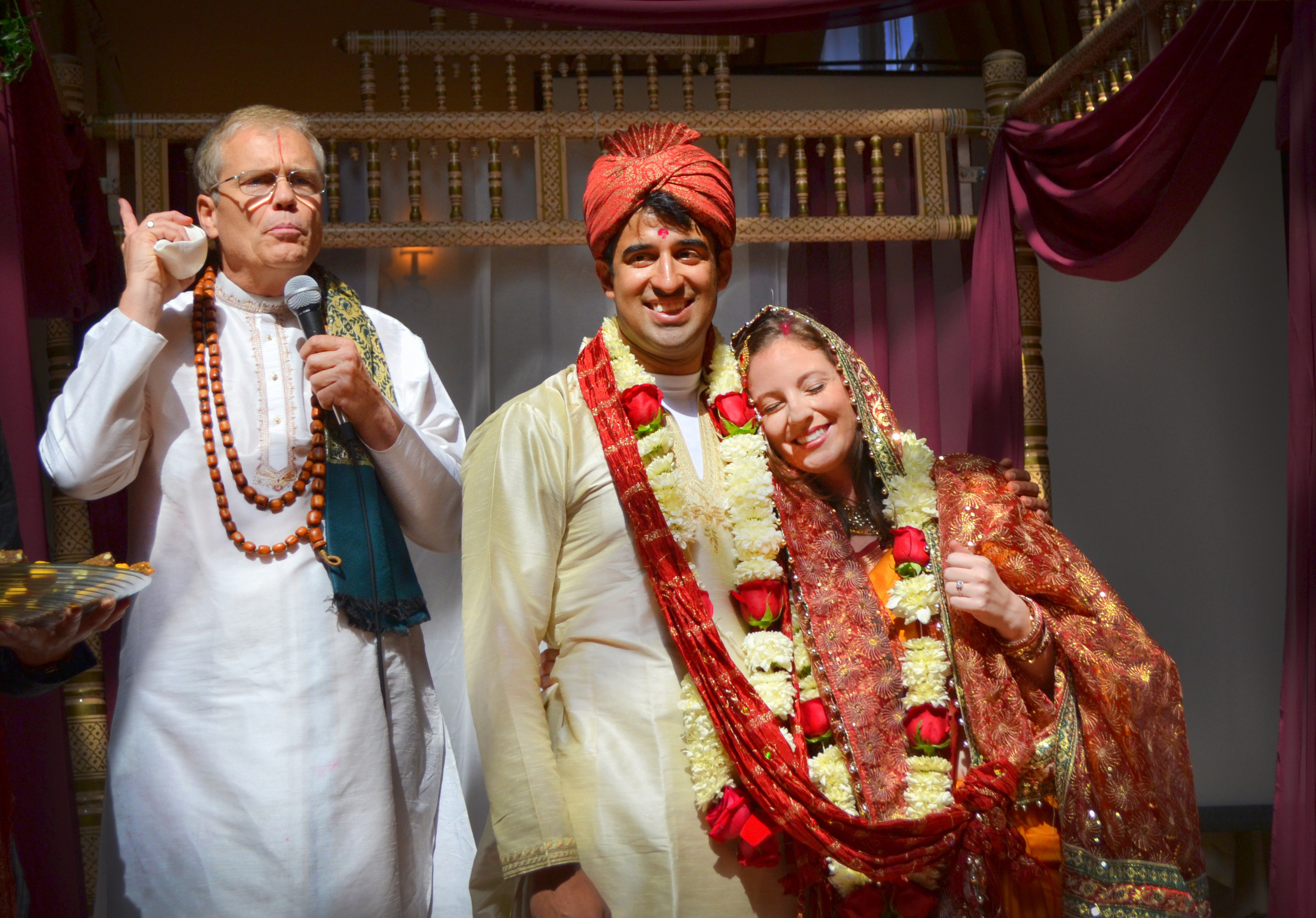The incense was there. So was the tikka powder and the ceremonial grains of rice. So were the turbans, the saris, and the kurta pajamas. The wedding had all of the makings of a Hindu shaadi, but in one major way, it was far from traditional.
When Neil Bajpayee, a Pennsylvania-born Indian-American, made his vows in Sanskrit to Stephanie Young, a Californian raised in a non-religious family, he became the first member of his family to marry a non-Indian, non-Hindu.
Shukavak Dasa, the Hindu priest marrying the couple, had seen it all before.
Weddings between Indian-American Hindus and non-Hindus are rare. Pew Research reported as many as 94 percent of Hindus in the U.S. were married to other Hindus in 2012. But even if interfaith Hindu weddings are uncommon now, Dasa sees them as a growing trend.
“In general Indian parents don’t like [interracial, interfaith marriages]; they would like their children to marry nice Indian boys and girls in their own community,” Dasa said, but, he added, “We have a lot of parents who are now saying, ‘I don’t really care, as long as my children are happy.”’
And that is when Dasa comes in. His specialty is interfaith Hindu weddings.
Dasa, 60, is white. He was raised in Canada in an Anglican family. He took an interest in Eastern religions as a teenager, then studied Sanskrit and Indian studies at the University of Toronto, where he earned a Ph.D. in Eastern theology. Along the way, he also became a devout practitioner of Hinduism. Then in the early ‘80s, he performed his first Hindu wedding.
“I had never even seen a Hindu wedding!” Dasa said, with a laugh.
Decades later, weddings have become Dasa’s main business. He is based in Riverside, where he is the head priest of Shri Lakshmi Narayan Temple. He performs many Hindu-to-Hindu weddings.
But word of mouth has made him a go-to officiant for Hindu mixed-religious weddings, not just in Southern California, but also worldwide. He has married couples around the U.S. and in places as far away as Russia and Hong Kong.
Dasa said that when he started out, there were few Hindu priests in California. But as South Asian communities have grown in the state, so has the demand for wedding officiants. And he has noticed Hindu priests finding niches.
“The Gujarati priest will work with the Gujarati community, the Punjabi priest will work with the Punjabi community, and so on like that,” Dasa said, “The typical scenario for me is, a young Hindu boy or girl goes off to college, falls in love with a Jewish, Christian or non-Hindu partner and wants to get married. ‘Oh, God, what can you do? Call the priest who can put one foot in both worlds.’”
Dasa, who is on faculty at the Claremont School of Theology, applies classroom-teaching skills while officiating weddings, taking time to explain Hindu customs. During the Bajpayee-Young wedding in Pasadena last May, he coached the bride’s parents through Sanskrit prayers and explained the symbolism behind the small flame, the flower garlands, and each part of the ceremony to the diverse crowd.
Bajpayee pointed out that many of his Hindu relatives had never understood what had been going on during their own weddings. “There’s just this norm in Hindu ceremonies that it’s not understandable sometimes,” he said, adding that his family members enjoyed Dasa’s informative approach to the ceremony.
Dasa is willing to customize ceremonies to fit the wishes of the couple. Bajpayee and Young, for example, asked for a shortened version of a traditional Hindu ceremony, which sometimes can last hours.
Dasa also worked with the couple to create a ceremony with more equal gender roles.
“One of the vows, literally if you translated it, was like, ‘As your wife I promise to cook you a hot meal every night,’” Young said, “I looked at it not with a lot of judgment, but I thought if I were to go through this, I wouldn’t want that.”
Dasa knows not every Hindu would agree with his willingness to occasionally break traditions. But he feels that adaptability is important for keeping millennia-old customs relevant.
Dasa, who said it took his own parents several years to feel comfortable with his conversion to Hinduism, understands some families’ hesitations about their children straying from the flock.
“I know for a fact that a Christian marrying a Hindu is not going to be as Christian and a Hindu is not going to be as Hindu, in general. So in some ways, we’re facilitating the watering down [of faith],” Dasa said. “But the other side of it is, we’re facilitating life.”
Dasa has a wife of nearly 40 years who is also a Hindu. Together, they have nine adult children, a few of whom are married. Some have chosen to have Hindu weddings, others have chosen blended or secular ceremonies. Though Dasa is a man of devout faith, he said he is happy to see his children, as well as the hundreds of young couples who he has married, choose their own spiritual paths.
Weddings, regardless of their religious style, Dasa said, “are all joyous.”
Read this story on KPCC
